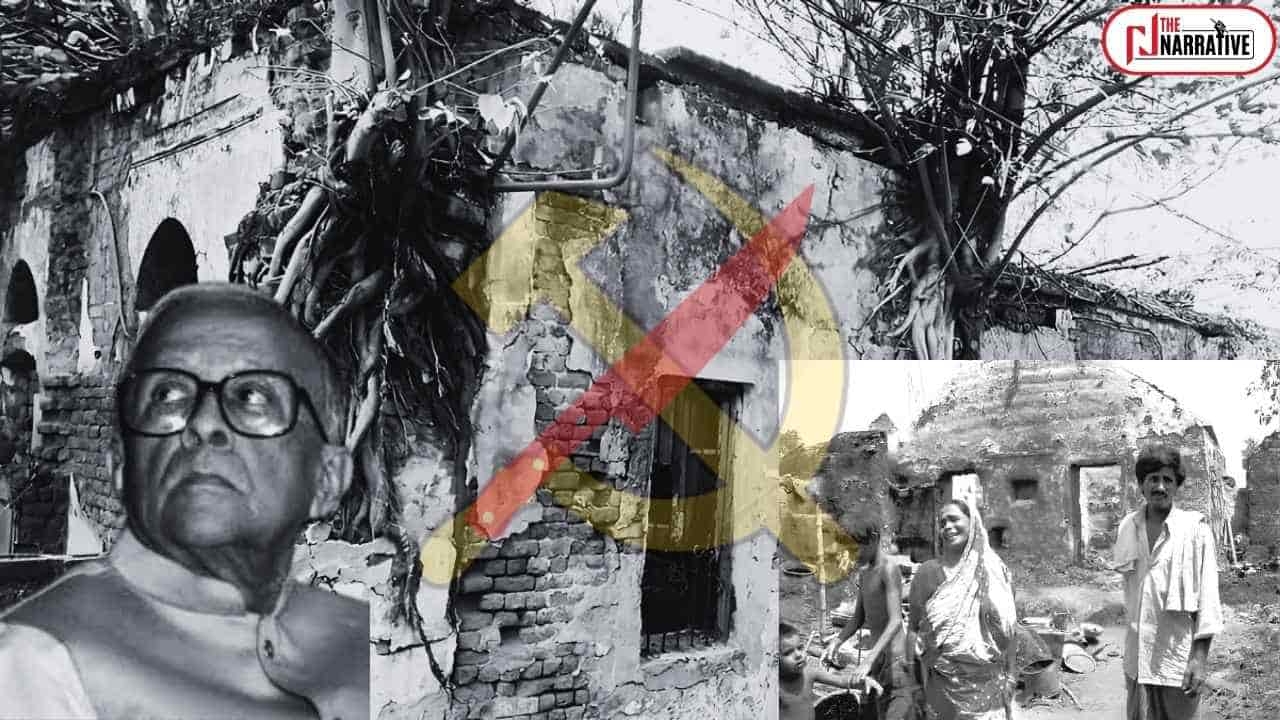The Dark Chapter of West Bengal: Sainbari Killings and the Blood-Stained Legacy of CPI-M
05 Oct 2024 13:08:32

The Sainbari killings, a brutal massacre that unfolded in the small town of Burdwan, West Bengal, in March 1970, remains one of the most grotesque examples of political violence that still haunts the state’s collective memory.
It was an early sign of the violent politics that would come to characterise the CPI-M, much before they officially seized power as the ruling party in 1977.
The ruthlessness of the Communist cadres in the incident is chilling, and their subsequent rise to power reveals a disturbing aspect of West Bengal's political history, one that casts a long shadow over the state's democratic fabric.
The Bloodshed of 1970
The incident took place when West Bengal was already on the edge, grappling with socio-political upheaval. CPI-M cadres, emboldened by their growing influence, were keen on eliminating political opposition.
Their target on that fateful day was the Sain family, staunch supporters of the Congress party and prominent political figures in the Burdwan district.
What unfolded was nothing short of barbaric. Two Sain brothers, both Congress leaders, were murdered in cold blood by CPI-M goons.
But what transpired after the killings takes the level of inhumanity to new depths.
As if the murders weren’t enough, the attackers forced the mother of the slain brothers to eat rice soaked in the blood of her own sons.
This act of unimaginable cruelty left her shattered, mentally broken, a trauma from which she would never recover.
She lived out the rest of her life in a state of insanity until her death a decade later.
The message from the Communists was clear: opposition to their ideology would be met with unimaginable violence.
The Aftermath and Political Hypocrisy
Despite the gruesome nature of the murders, justice was never served. The perpetrators of the Sainbari killings rose through the ranks of the CPI-M and eventually became ministers and MPs under the Left Front government.
This shocking twist, where murderers became lawmakers, reflects a systemic failure in holding the powerful accountable.
It also highlights the deep-rooted culture of impunity that the CPI-M created for themselves, a culture that allowed their cadres to resort to violence without fear of repercussions.
The Sainbari killings symbolise a dark era of political terror in West Bengal. Ironically, it is the same Congress party, whose members were targeted and butchered, that later found itself politically dependent on the CPI-M in several alliances.
This unholy collaboration betrays the values of justice and exposes the Congress’s willingness to align with those responsible for one of the most heinous political crimes in the state’s history.
How can the party, once proud of its democratic ideals, look away from the bloodstains on the CPI-M’s hands?
The Brutality of the CPI-M: A Precursor to Future Violence
The Sainbari massacre was not an isolated event but rather an omen of things to come. CPI-M, which came to power in 1977, ruled West Bengal for more than three decades with an iron fist.
During their tenure, political violence became a regular feature. Murders, abductions, and intimidation were often used to silence opposition, especially in rural areas where the CPI-M's influence was near absolute.
The legacy of violence that started with incidents like the Sainbari killings seeped into the political fabric of the state.
The CPI-M used fear as a tool of governance, betraying the trust of the people who had initially rallied behind them, hoping for change.
The very leaders and cadres involved in the Sainbari killings continued to hold significant political power, emboldened by the protection of the state machinery.
Such individuals, who should have faced the full force of the law, instead walked freely in the corridors of power, a stark reminder of the corruption and decay in the system.
Communist Legacy and Modern-Day Irony
Today, as political winds shift and new alliances form, the irony of history cannot be ignored.
The Congress, which lost its loyal soldiers to the CPI-M’s bloody politics, now shares platforms and agendas with the same party in various political alignments.
Such coalitions not only undermine the justice denied to the Sain family but also reflect the disingenuousness of political leadership.
The atrocities committed during the Sainbari killings should serve as a wake-up call to the people of West Bengal and beyond.
It is a stark reminder that political expediency can lead to the erosion of moral values and justice.
CPI-M’s legacy in West Bengal is drenched in blood, and the Sainbari killings are perhaps the most damning evidence of this.
Conclusion: Remembering the Victims, Condemning the Perpetrators
The Sainbari killings are not just a footnote in history but a testament to the dangerous consequences of political extremism and unchecked power.
The CPI-M, through acts like these, demonstrated their willingness to go to any lengths, including murder, to achieve political dominance.
The Congress party’s eventual collaboration with such forces only adds salt to the wounds of those who suffered from this brutality.
As we remember the tragic events of 1970, we must remain vigilant against any form of political violence, lest history repeat itself.
The justice denied to the Sain family must be a reminder to all that the true spirit of democracy can only be upheld when those who commit atrocities are held accountable, no matter how powerful they become. The victims deserve our memory, and the perpetrators, our condemnation.
Article by
Shomen Chandra
Sub Editor, The Narrative